We said goodbye to Tessie (Mariposa Cirsti) on June 19, 2021. (She was born May 25, 2003.) She was my spiritual warhorse, a mare I brought into my life because the crying hadn’t stopped after the Feb. 14 mass shooting at NIU. I met some wonderful people through her and learned how to ride through fear, how to breathe, and eventually find the fun again. The following is the story of those last days. Feel free not to read. But this is what I have. I post this though my tears.
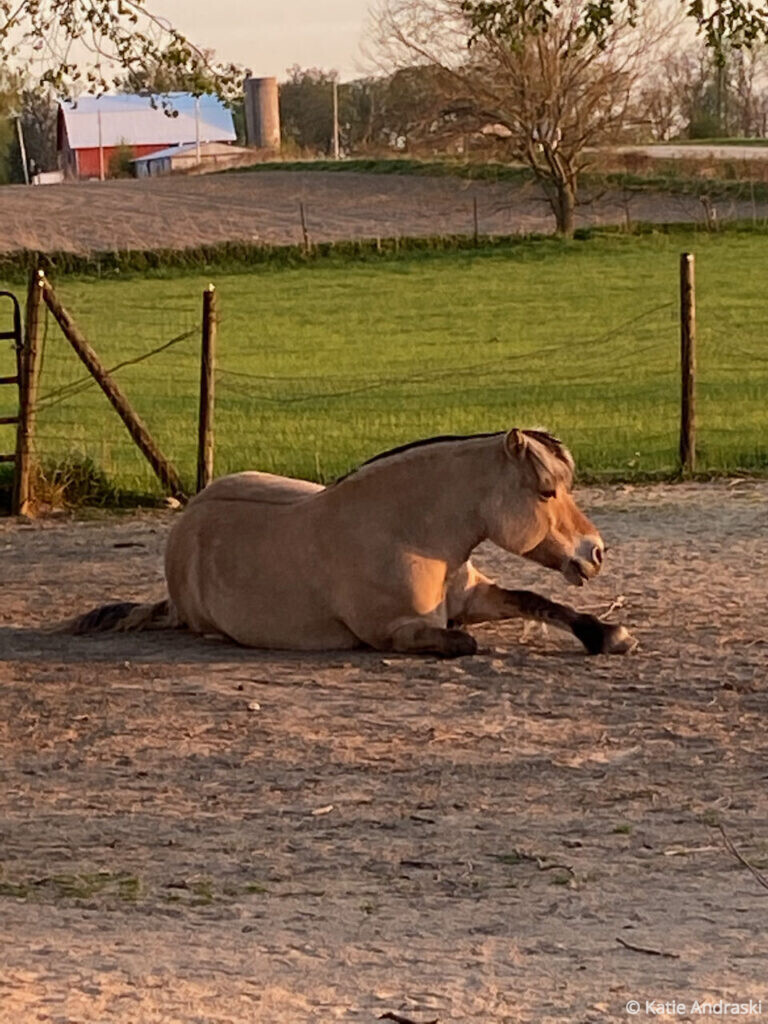
The above picture shows the beginning of the end of our time with Tessie. In early May, we got home from church and saw lying down, which is not a normal behavior for her. Then she started rolling. She’d get up and lie down. Get up and lie down. She didn’t look good, so we called Kendall Road, a local equine hospital that treated her three years ago for a splenic entrapment. It turned out she had another nephrosplenic entrapment, which means her bowel flipped over the ligament that runs between the spleen and the left kidney. Often the spleen enlarges. If left alone the horse can die, though letting them roll can flip the colon back into place. (At least that’s my understanding.)
It was about midnight when Dr. Margaret put her arm up Tessie’s rectum to see if her bowel was displaced. They were. She gave her a shot and then trotted her in the round pen behind the clinic. Tessie was better by the next day and they sent her home. I tried to feed her small meals or soaked hay cubes but she wasn’t interested. The next morning she’d not eaten her hay, so we took her back. They put her on IVs to flush her kidneys because they were not working right. It took a few days before Tessie was able to come home. We visited her daily. Dr. Vasic said he could tell when she started to feel better because she took an interest in the other horses and activities. They kept her fed by grazing her for ten minutes six times a day.
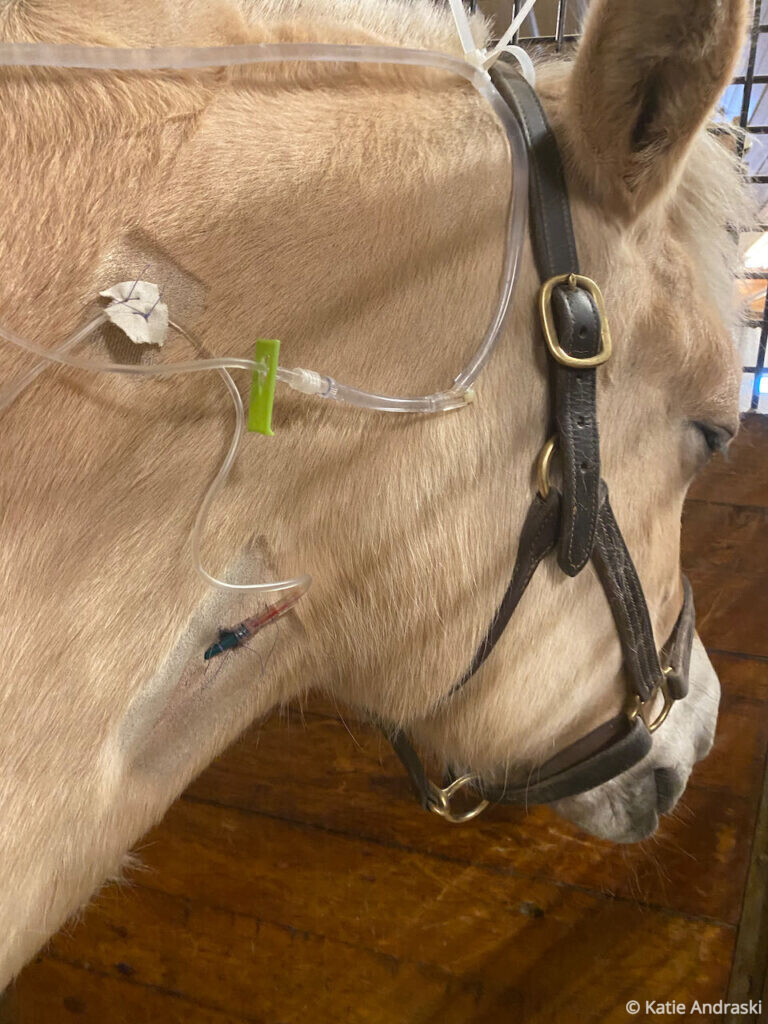
A few weeks later we walked out to the barn and saw Tessie standing with her head level, not looking good. Her hay was untouched. It had been one of those hot, close nights. She’d spiked a fever, so Kendall Road did not want her coming in. Dr. Vasic thought maybe she’d caught a virus and would get over it.
I called my vet and he came out to see if she’d had another entrapment. She didn’t. The next day her temperature had spiked at 107, so he offered to take her to his clinic to cool her and hydrate her. Tessie was there for two days with 50 liters of IV fluids being pumped into her. Her white cell count was low, which meant she had an infection somewhere. Dr. Sugdon stayed with her those two nights and talked about how she’d eat and then stop, all the while making all kinds of noises eating her hay. Both he and Kendall Road suggested we take her to the vet school at Madison to get to the bottom of her illness.
I hate the drive up 90, even with the detour we take up the backroads to Janesville. And this time we left from Byron. Tessie was full of herself. She wanted out of the trailer once we loaded her. She danced every time a semi roared past. Did I say how I hate that drive? She stepped off the trailer sweaty and very much alive.
At Madison we left her with Dr. Powers, a resident. Because of Covid we were not able to go into the barn with her or visit. She did not want to go in, so they backed her in. It was a long, dark week. I felt paralyzed, barely able to pray. Dr. Powers called me daily. They treated her for infected guttural pouches, which are located in the nose. (We’d treated her nasal discharge a few years earlier, but when it reappeared I put off taking care of it.) Dr. Powers was afraid it was strangles so she isolated Tessie. It is very contagious and has been going around in our area. It would have been a bad deal if Tessie had shut down the Vet school because she’d been stabled in the general population.
I used a prayer that I learned in my inner healing class: “Even though my neglect to treat Tessie’s guttural pouches might shut down the vet school, I am loved and accepted by God.” Then you go to the next level: “Even though my neglect to treat Tessie’s guttural pouches might shut down the vet school, I love and accept myself. Even though my neglect to treat Tessie’s guttural pouches might shut down the vet school, I trust you Lord.” The slamming of my shame and God’s acceptance and love, pulverized the deep, dark shame I might have suffered for those few days before Tessie was cleared of strangles.
When that treatment was finished, and Tessie was cleared of the strangles Dr. Powers wanted to discharge her but she looked like she was colicking by lying down and getting up again. How was I going to trailer her if she wanted to lie down? Dr. Sugdon advised me to insist she stay put.
They checked her for ulcers, for sand in her gut, and splenic entrapments. They checked her abdomen to see if her infection was there. They oiled her to see how her poop moved through her. But it wasn’t moving. Then they isolated her again and stopped taking her for walks or letting her graze because they thought she had salmonella. Once she passed her manure, Tessie stopped eating and Dr. Powers invited us to come see her the next day. Before I hung up the phone, I choked out, “Could you lay hands on Tessie and pray for her? Sometimes God works healing.” “I can do that,” Dr. Powers said.
I was doing chores when Dr. Sugdon called to let me know that Tessie’s Cushings test was well within normal ranges. (He had said when he admitted her that the white blood cell count being low might be because of that.) He said, “Enough is enough, it’s time to let her go. People worry that it might be too early or too late to euthanize their horse, but the people are important. She waxes and wanes. She gets better and then gets sick. You can’t keep doing this,” he said kindly, very kindly.
I’ve had vets string us along, because it is hard for them to let a patient go and sometimes a sick animal helps them pay the bills and stay busy. (I know that is cynical but I’ve had vets that didn’t seem to let me let go—we can try this or we can try that…and it goes on, ultimately with the same result.)
Dr. Powers said we could try exploratory surgery. “Absolutely not.” “You could take her to Kendall Road to see if they could help her, we could visit, it’s closer.” “I think it’s time to let her go,” I said. “Fair enough,” she replied. I told Bruce that’s what I’d decided. He nodded. We finished chores and drove the long, hard drive up 90 past Lake Winona to the university.
I felt relieved, an odd emotion, considering I’d decided to break my heart, Bruce’s heart, my other horse, Morgen’s heart. But I’ve felt that relief before, in the midst of tears, that this is what needs to be done. Tessie wasn’t getting better. A fjord that won’t eat is a very sick horse. Waves of sadness hit. I remembered one of the happiest days of my life, was when I drove to Wisconsin to meet her. When I sat on her back this amazing sense of confidence welled up at me, and liking. She liked me. I knew within three strides I wanted to bring her home. Even Patti Jo Walters, the woman selling her said she could tell we clicked.
Tessie introduced me to good friends that I rode with early on Saturday mornings and weekday afternoons. Yearly we rode by the bluebells, in a local park, but this year I did not because it was too windy or I was busy doing something in the house. Regret. I returned to Everbold Farms, a barn where I’d ridden in the early 90’s, my friendship with the Youngs picking up like we’d never left off. Tessie moved off my leg, slowed when I breathed hard. There is an intimacy between horse and human when you drop your legs along their side.
When we arrived at Madison we saw the trailer had a flat tire. One more thing on this sad, dark day.
The barn struck me as a very dark place. Or maybe it was my decision.
Tessie was lying down in her stall full of shavings. Someone had cleaned off her butt and combed out her tail. She didn’t look good. “You’re going to make this easy,” I told her. but it’s never easy. She did not get up when we entered her stall. Bruce put his arms around her neck. She closed her eyes like she wanted to sleep. He said she thought she was exhausted. She was a very sick horse.
Through tears, I read a prayer from Every Moment Holy that was written for when we say goodbye to a beloved animal: “Our hearts were unprepared for such loss, and we are deeply grieved…Oh Lord how long until it is made right? How long till all is made right? How long till your wild grace restores all loss and upends every leaving? How long till these hurts are healed and these griefs eternally sealed and set aside by the finally completed work of your redeeming love?
“We know if no sparrow falls beyond the ken of your compassion, that you also, in this moment, inhabit our sadness at this wounding, your weeping at the world’s brokenness, somehow deeper than our own.
“We know that the final working of your redemption will be far reaching, encompassing all things in heaven and on earth, so that no good thing will be lost forever, so that even our sorrow at the loss of this beloved creature will somehow, someday be met and fulfilled, and in joy made forever complete.
“Comfort us in the meantime, O Lord, for the ache of these days is real.”
I told Tessie she was a good horse except when she bolted, tucking her head in and going. She taught me to breathe through being out of control, to circle, bring her back. I learned that fear is a liar.
She closed her eyes. Bruce said she had to have been tired from all the medical procedures.
When she stood up I read Romans 8 to her: “For I consider the sufferings of this present time are not worth comparing with the glory that is to be revealed to us For the creation waits with eager longing for the revealing of the sons of God. For the creation was subjected to fut ility, not willingly but because of him who subjected it, in hope that the creation itself will be set free from tis bondage to corruption and obtain the freedom of the glory of the children of God.”
She listened. I offered her a treat. She would not take it. A fjord who doesn’t want to eat is a very sick horse. Her pans were spread out in the stall—grass, wet grass, wet mash, water—all untouched.
And then we let her go.
She was beautiful even in death, her dorsal stripe lining her back.
Bruce wept at the loss of such a good friend.
Tessie’s neigh was like a bell. And sometimes she would whisper.
The flat tire was a grace to take us out of our grief, to the nuts and bolts of jacks and tires and our way home back down highway 14 through the rolling country of south central Wisconsin.
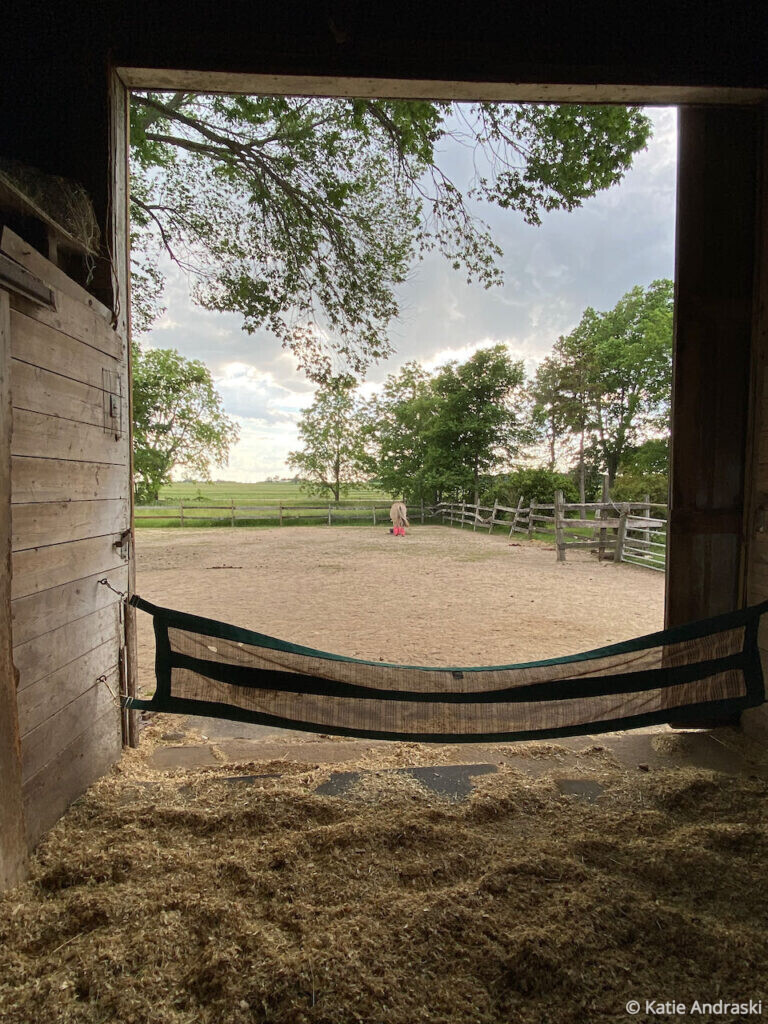
When we drove in the driveway I half expected Morgen to run out, buck, and shake her head, celebrating the sound of the trailer and her friend returning, and break our hearts. But she did not. She stayed in the barn catching whatever breeze came through the open door.
The week following was filled with darkness—full of the wish I could have brought her home, or taken her to Kendall Road so she didn’t feel abandoned, all those medical tests—the sedation, the poking, the arms stuck up her rear, the being shut in a stall, and me not there, not there, not there asking her to come back to me, to live. Tessie’s last week was not a good week. That morning when I cleaned the barn, I heard the Lord say quietly, “but I was tortured too.”
And my spiritual director said, “Christ is in all things around all things. He was in Tessie and with her that week.”
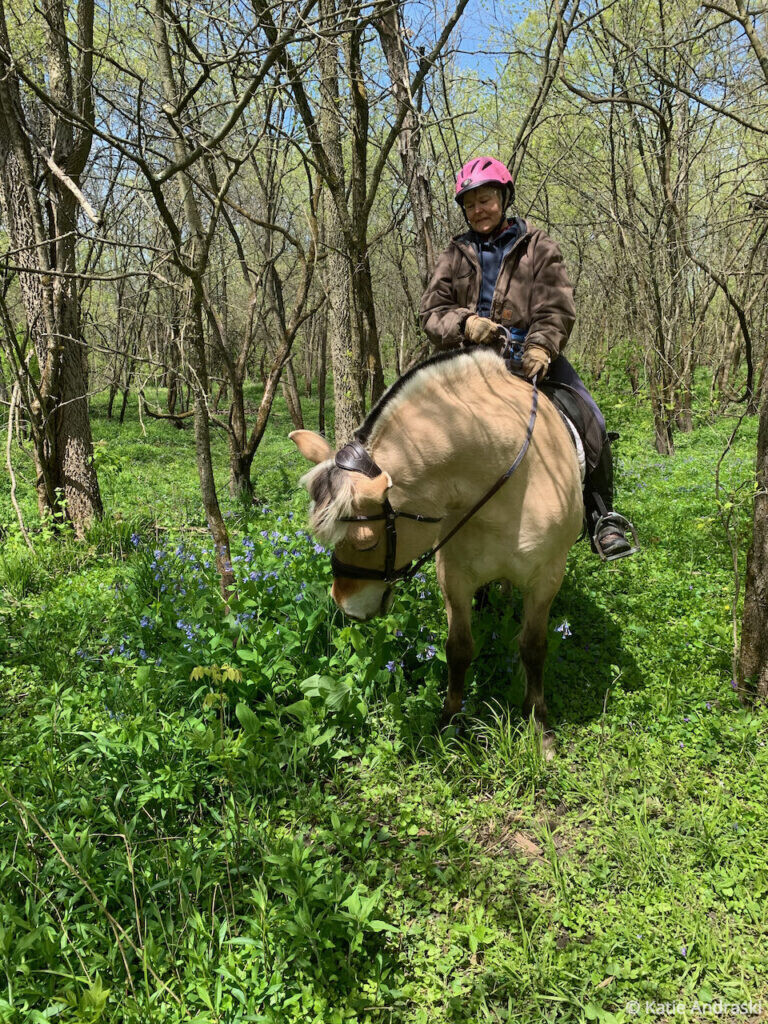
During my inner healing class the teacher lead us through a guided imagination about the river where we thought of our bodies as a river bed, our spirits as the water. She wanted us to drum up our resentment or bitterness, but I remembered the new water crossing on the Kishwaukee joining Deer Run and Oak Ridge. You walk out of the woods where the bluebells bloom and bear left along the river. The water catches sunlight. And high tension lines, humming in the humidity cross here, coming from the Byron nuclear plant. The pylons are so close to the river, I wonder when it will shove its shoulder onto the bank and topple the thing, throwing the whole region into darkness. Riding under those lines I could almost feel the static, the power and hoped they wouldn’t flash lightning onto us. Tessie grabbed the tall grass on either side of the path. Sometimes we’d turn toward the river and see how it elbowed the bank toppling giant trees into the water, those trees now skinned of bark, fallen, almost more gigantic now that they are fallen. I rode Tessie in that park with much joy and long talks with friends. We’ve seen egrets lift off the river and eagles swoop down.
With all these regrets, this past tripping—wishing I could go back in time and change things—take Tessie to Kendall Road instead—I saw that river again. I rode Tessie into it, slipped off her back, the water swimming around my calves, slipped the bridle out of her mouth and let her loose to go upstream, to meet the great river that flows from mountain after Jesus’ foot has stepped down into our world. The regrets left. The grief, the proper grief for such a big loss, remained. Those sweet tears are so much gift.
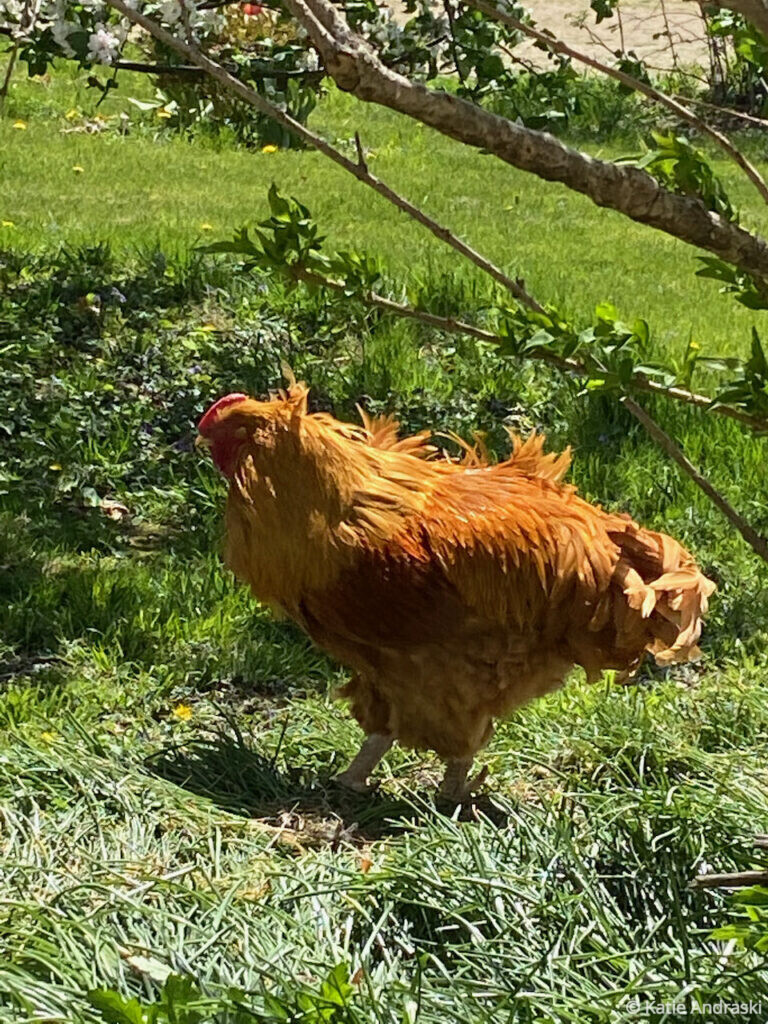
The rooster, who survived a coyote attack because he lived in the barn away from the flock, came back to the barn, nested in the hay, and died. He showed me how sometimes being the outsider, roosting away from the flock, can be a way toward life. Bruce buried him behind the shed.
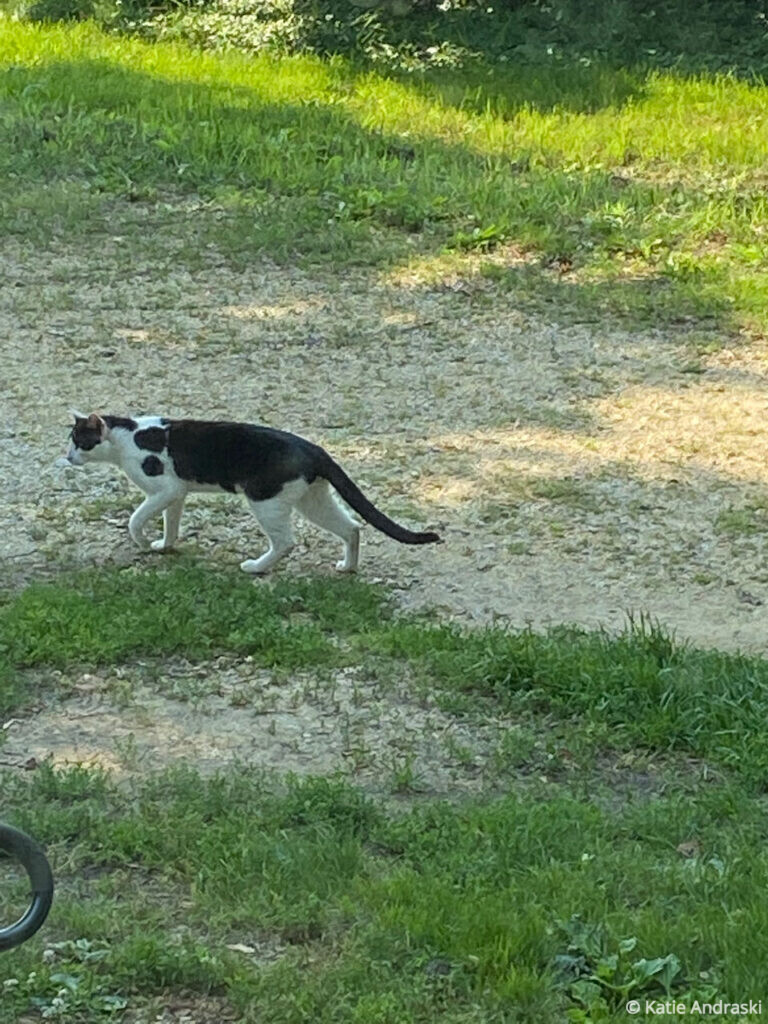
At times of grief it seems that stray cats show up. This time a black and white cat, with masks over his eyes started hunting in the south pasture. We started putting food out by the fence line. We looked for him to show up. Once when I was walking the dogs he was lying in the grass not three feet away from us. So we’re back to nudging each other when the cat shows up. “Cat sighting. Cat sighting!” We are glad he will cut down on the mice and mole population.
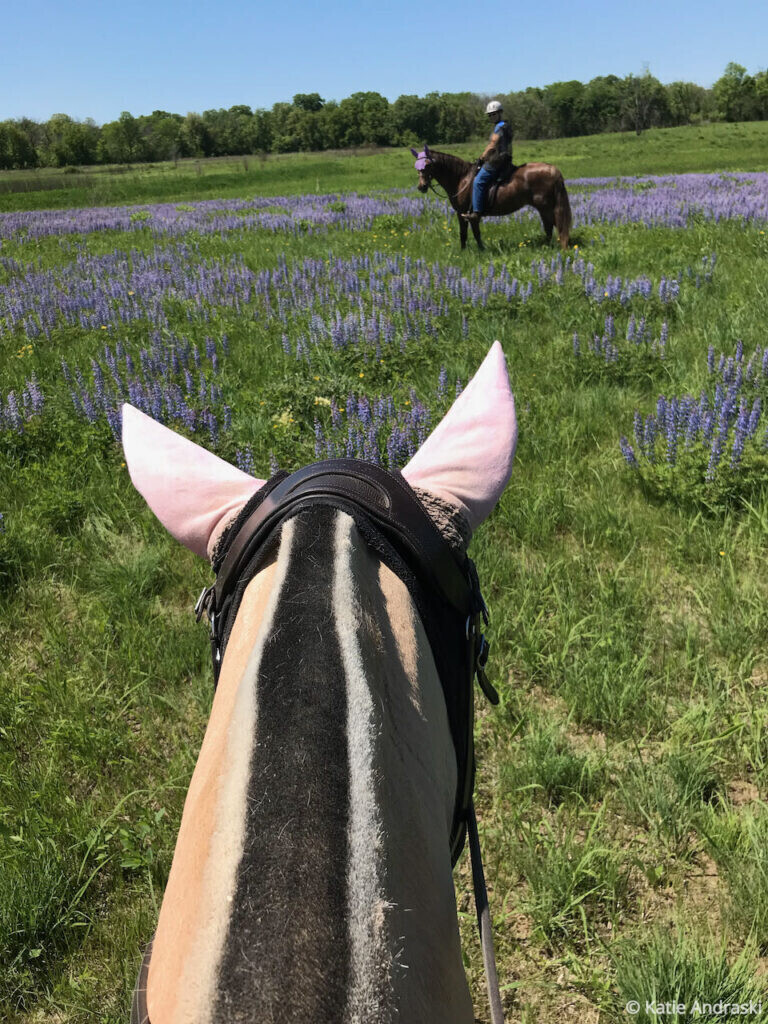
My friends showed up too. Chris, whose horse Ginger, loaned us confidence on those rides where I could taste the fear, even though Tessie kept walking, gave me a sculpture of a girl holding her horse’s head. My old, good friend, Ginny sent flowers. We started talking again. Our neighbor brought a hug and shasta daisies. Other friends sent cards. I didn’t know how much cards meant until now, with this loss. How my friends took a trip to town, took time to pick out a card and put it in the mail. Pastor Ken Tanner said, “Oh how you loved that horse.” Bruce and I felt held.
Tessie’s necropsy showed she was a very sick horse. She had too much fluid around her heart, and in her lungs, which might have been from her cecum being displaced. She also had peritonitis in her cecum and adhesions. Her kidneys were damaged. It appears as though her cecum had been displaced before. And her food wasn’t moving through her. Even I noticed her poops were dry and small when she was here. Dr. Powers explained that she dehydrated into her colon instead of sending water to the rest of her body and that’s how her kidneys were damaged.
Dr. Sugdon called and explained the results in another voice, so I could understand them. He started by saying we’d made the right decision to let her go.
The final report brought blessed closure because I could read how Tessie was treated that last week, how very sick she was. Her tail brushed out and clean, well, she had been well tended to.
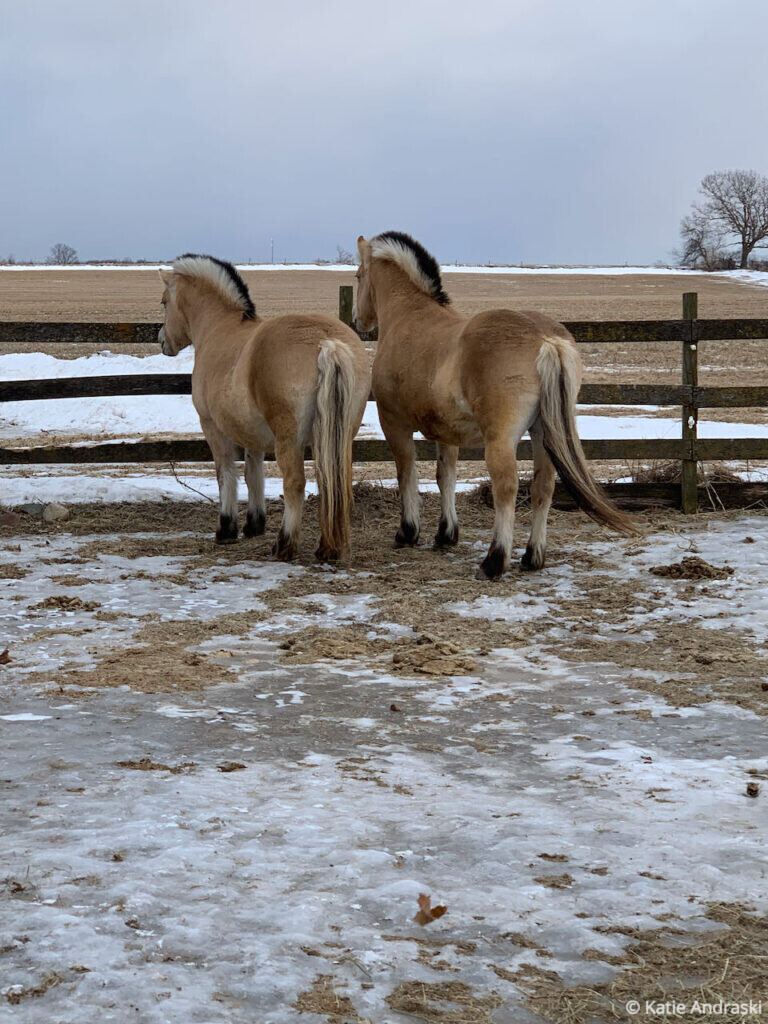
By rights we should get Morgen another horse friend, but I’ve always said one is enough, two is too many. I can’t bear the thought right now. I feel a kind of relief with just the one. We’ve driven her nearly every day along the fields. (Our hay guy won’t be happy, though Bruce says a discbine will pick up the laid down grass.) She’s so much out of shape that we just walk and drive. We both admire the clover. During morning chores Morgen comes in the barn and I don those prickly gloves and scratch her back and shoulders, her nose curling in pleasure.
Tessie’s stall empty beside us.
I hope to see Tessie again in the resurrection of the dead. I pray for her still, that she be taken up in God’s presence, maybe saddled by an angel to ride out as the pale horse of the apocalypse. I take comfort from a passage in C.S. Lewis’s The Great Divorce, where the narrator sees an ordinary woman, being followed by a train of animals. The Teacher says, “Every beast and bird that came near her had its place in her love. In her they became themselves. And now the abundance of life she has in Christ from the Father flows over into them” (110 – 111).
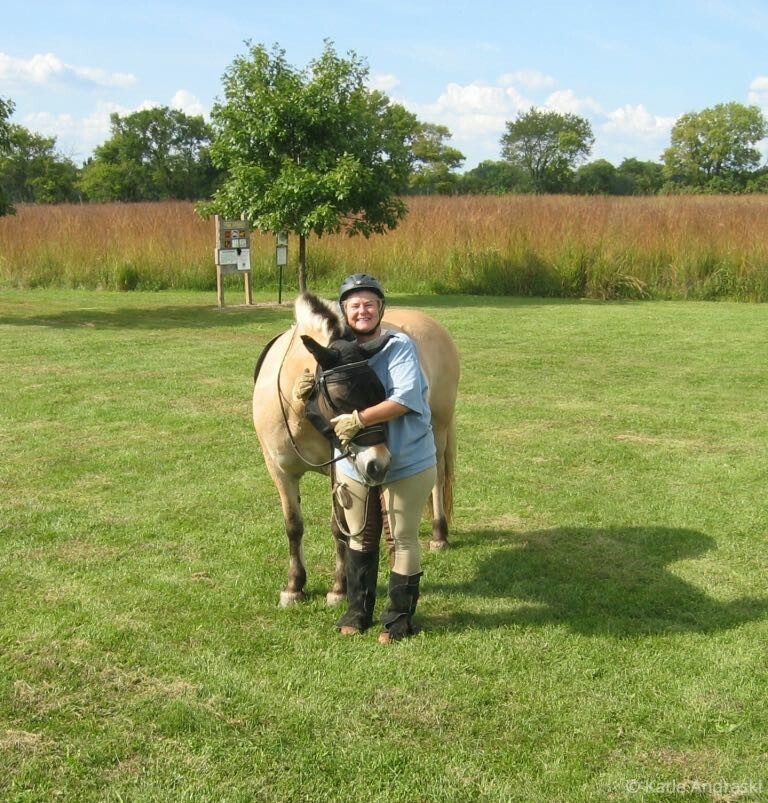
One night during that dark week Bruce and I stood at the head of our driveway watching bolts of lightning land the ground. They were thick, bolts, not flashes lighting up the southwestern sky. We looked on the map and saw the storm was in Peoria, a good long distance away. Let me leave you with a poem I wrote for a friend’s horse that was struck by lightning that might apply to Tessie’s leap into God’s presence.
Lightning Strikes
Lightning strikes the buckle
the only steel in the field
hotter than flames in the sun
weaving the colt’s blood
into lace along his body,
the colt rising,
hitched to chariots of fire,
commissioned to God’s use
the pale, or black, or red horse
hauling the winds aside,
smashing terror to the earth,
a horse rearing and stomping,
sending sparks into the stars,
grief to his mistress
who just now threw her legs over his back
matched spine to spine,
bodies chatting with each other
inside leg to outside rein
the colt’s legs lifting to the air
lending her strength
and speed and breath.
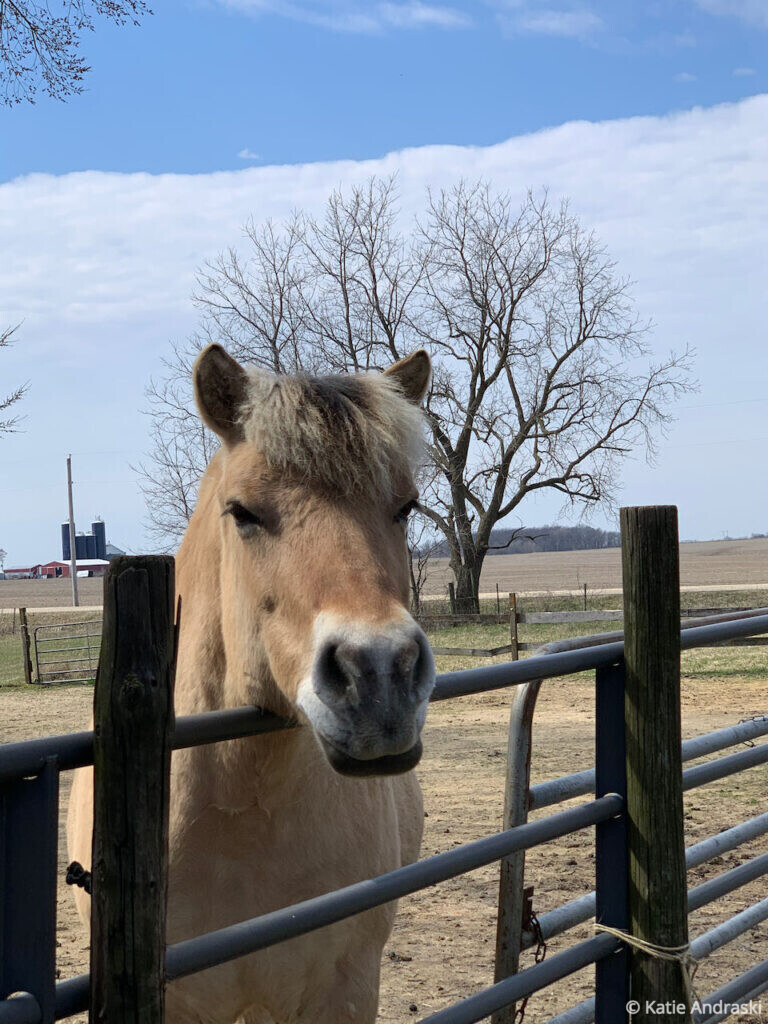
If you’d like to subscribe to this blog–I hope to post more frequently–click here: [mailerlite_form form_id=4]


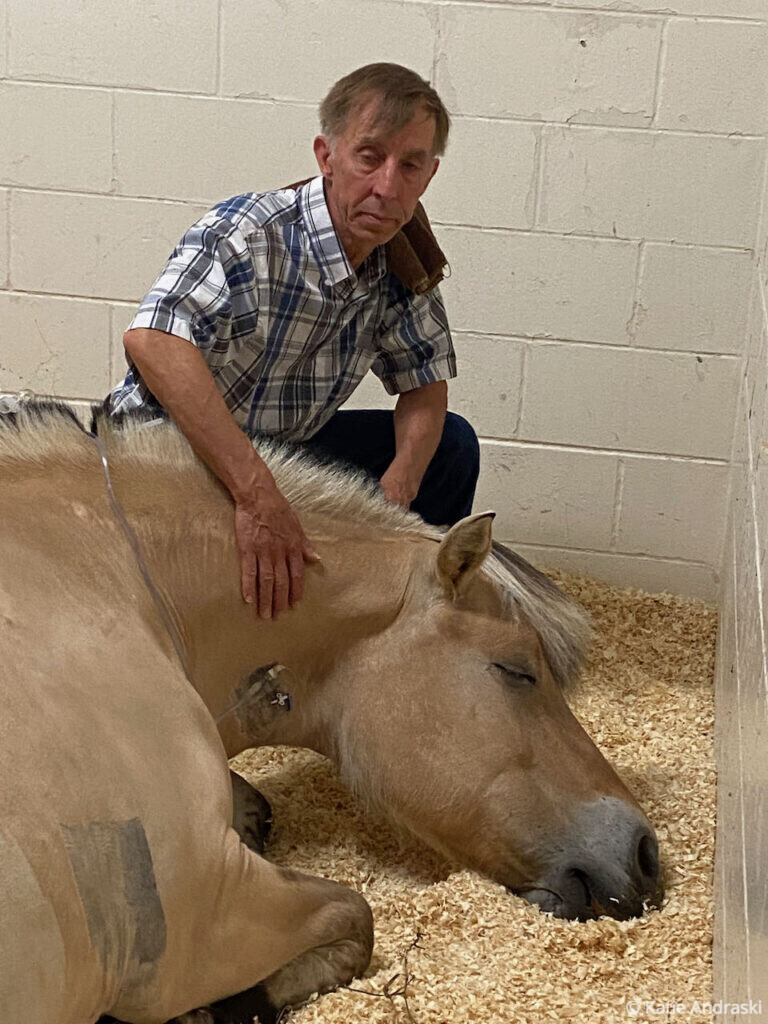
Katie, my heart sank when I saw the title of your blog post. You’ve given Tessie such a beautiful tribute. I’m so sorry for your loss.
Thanks so much for reading this. This was hard to write. Hard to post. I miss her so much.
So long, Tessie. We came to know you as Katie’s horse. Or was Katie your human? You were a breed we’d never seen before, but even all the more beautiful, therefore. Bruce and Katie cared for you . . . and about you . . . and Katie wrote stories with you in them so that we could care about you too.
Maybe you knew this. Maybe you didn’t. Maybe you just knew that your humans loved you and had fun with you and you had a home . . . a good home . . . with them and with Morgen and the dog and cat and the rooster and all creatures great and small beloved by God who you got to see before any of us who still await our turns.
So . . . so long, Tessie.
We’ll see you in Glory!
Love, Mark & Karen
Your words are so comforting and bring tears. So kind. Thanks for reading and for being our friends. Won’t it be wonderful when we go home to glory and get to see Him face to face and be reunited with those who have gone before? Let’s meet on Zoom soon too! Love, Katie and Bruce
We will soon Zoom, Sister. Maybe this Sunday. OK? Love, -M&K
Sounds good. Would love to catch up on news…
Kate, I’m so glad I was able to meet her, and you. What a blessed tribute. A soul who will be remembered.
I was very honored when you came to visit that summer. You’re welcome to stop anytime you’re out this way. I was also grateful to 30/30 for the opportunity to write those poems that were brimming. Tessie was a great horse. I’m glad you met her too.